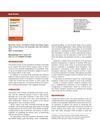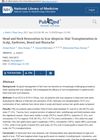
Search
forProducts matching "loss of body hair"
Tracking 3 products like 257 RU58841 5% PG+ Ethanol, 260 RU58841 Powder and 260 RU58841 Powder from by companies like Anageninc. View all 3 products »
Sort by
Research
150-180 / 1000+ results

research The Use of Body Hair with Scalp Hair for Combination Grafting to Enhance Visual Density of Hair Transplantation and Increase Coverage in Advanced Alopecia
Using body hair with scalp hair for hair transplants improves density and coverage in severe hair loss cases.

research A Comparative Study on the Rate of Anagen Effluvium and Survival Rates of Scalp, Beard, and Chest Hair in Hair Restoration Procedures
Scalp and beard hair survive best in hair transplants, but the procedure needs high skill and takes longer.

research Alopecia Universalis After Alemtuzumab Treatment for Multiple Sclerosis: A Two-Year Follow-Up of Two Patients
Two patients developed complete hair loss after Alemtuzumab treatment for MS, with no regrowth after two years.

research Androgenic Alopecia: A Counterproductive Outcome of the Anabolic Effect of Androgens
Male pattern baldness is an unintended side effect of the body's use of androgens for muscle growth, especially in those genetically prone to it.
research Clinical Efficacy of Diphenylcyclopropenone in Alopecia Areata: Retrospective Data Analysis of 50 Patients
Diphenylcyclopropenone (DPCP) can help regrow hair in many alopecia areata patients but may cause side effects and relapses.

research Alopecia Universalis Following Interferon Alfa-2b and Ribavirin Treatment for Hepatitis C
A woman lost all her body hair after hepatitis C treatment, but it started to grow back a year after stopping the treatment.

research Characterizing Dermatological Conditions in the Transgender Population: A Cross-Sectional Study
Hormone therapy in transgender individuals can increase acne and affect hair growth and loss.

research Classifications of Patterned Hair Loss: A Review
Different types of hair loss need specific treatments, and while many classification systems exist, each has its flaws; more research is needed to refine these systems and treatments.

research A Review Study of Kriya Sharir of Hair
The review suggests that lifestyle, diet, and environment affect hair loss, and Ayurveda offers ways to maintain hair health.

research Focus on Herbal Home Remedies for Hair Regrowth and Loss
Herbal home remedies can effectively treat hair loss with fewer side effects.

research Book Review: Facial Plastic Surgery Clinics of North America: Hair Restoration
Book covers all aspects of hair restoration surgery, highly recommended.

research Male Pattern Hair Loss: Current Understanding
Genetics and hormones cause hair loss; finasteride treats it safely.

research Diffuse Hair Loss in Secondary Syphilis in HIV Positive Man: Case Report
A man with HIV had hair loss due to syphilis, which improved after penicillin treatment.

research Recent Advances in the Chemistry and Pharmacological Activity of New Steroidal Antiandrogens and 5α-Reductase Inhibitors
New compounds show promise for treating hair loss, enlarged prostate, and prostate cancer, with some being more effective and having different side effects than current treatments.

research A Bald Statement: Current Approaches to Manipulate Miniaturization Focus Only on Promoting Hair Growth
The conclusion is that future hair loss treatments should target the root causes of hair thinning, not just promote hair growth.

research Aging and Anti-Aging in Hair and Hair Loss
Hair ages and thins due to factors like inflammation and stress, and treatments like antioxidants and hormones might improve hair health.

research Hair and Cancer Chemotherapy: Consequences and Nursing Care - A Literature Study
Chemotherapy-induced hair loss significantly affects patients' well-being, and nurses are key in helping them cope, but more research is needed to find effective treatments.

research A Management Model to Promote Hair Growth for Androgenetic Alopecia Cases Through Yoga and Ayurveda
Yoga and Ayurveda, including stress management and herbal oil use, can potentially reduce hair loss and promote hair growth, with further research needed for therapy protocols.

research Adipose-Derived Stem Cell-Based Therapies for Male/Female Pattern Hair Loss
Fat-derived stem cell therapies can potentially increase hair growth and thickness in people with hair loss.

research Alopecia Universalis in a Child with Good Response to Combination Therapy: A Case Report
A young child with complete hair loss improved significantly with a combination of hair growth treatments and laser therapy.

research Pharmacological BACE1 and BACE2 Inhibition Induces Hair Depigmentation by Inhibiting PMEL17 Processing in Mice
Blocking BACE1 and BACE2 enzymes causes hair color loss in mice.

research Androgens and Alopecia
Male hormones, particularly DHT, are linked to male pattern hair loss, and treatments like finasteride can help, but they don't work for postmenopausal women's hair loss, which may have different causes.

research Cutaneous Findings and Systemic Associations in Women With Polycystic Ovary Syndrome
Women with PCOS often have more body hair, acne, and skin darkening, and these signs are linked to metabolic issues like insulin resistance and high cholesterol.

research The Self in Obsessive-Compulsive-Related Disorders: Hoarding Disorder, Body Dysmorphic Disorder, and Trichotillomania
The conclusion is that self-concept, shame, and emotion regulation are key factors in hoarding disorder, body dysmorphic disorder, and trichotillomania, and should be targeted in treatment and research.

research Viral-Induced Rapidly Progressive Alopecia Universalis: A Case Report and Literature Review
COVID-19 may trigger or worsen rapid hair loss in alopecia areata.

research Head and Neck Restoration in Scar Alopecia: Hair Transplantation in Scalp, Eyebrows, Beard, and Mustache
Hair transplantation is effective for treating scar-related hair loss on the head and neck.

research SnapshotDx Quiz: August 2019
The research found that male pattern hair loss is mostly genetic and involves hair thinning due to hormonal effects and changes in gene expression.

research Gender-Affirming Hair Procedures
Hair transplants help transgender patients look more like their gender identity, with different procedures for trans women and men.
research Mesenchymal Stem Cell Therapy in Alopecia Areata: Visual and Molecular Evidence from a Mouse Model
Mesenchymal Stem Cell therapy shows promise for treating hair loss in Alopecia Areata.